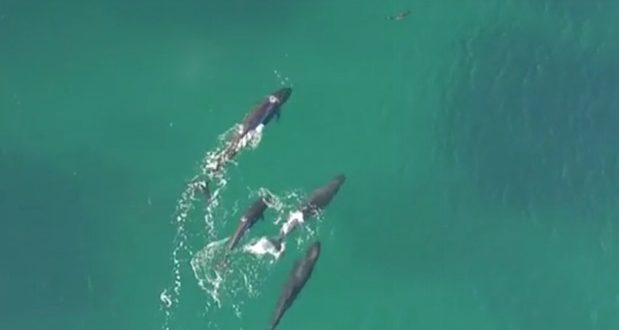New footage from Australia shows a pod of false killer whales hunt down a lone juvenile shark.
The video, captured by drone hobbyist Bruno Kataoka, shows the false killer whales chasing the shark, tiring it out and then going in for the kill.
Bruno Kataoka has filmed what experts believe to be four false killer whales, members of the dolphin family, expertly hunting the shark off Cronulla beach south of Sydney.
The dolphins, which grow between three and five metres long, were hunting a juvenile shark in a life and death battle.
After a desperate chase the leader of the pod can be seen attacking the shark, and dragging it down.
“National Geographic guys have been waiting months to get such a thing and we just happened to be there at the right moment at the right time,” says Mr Kataoka.
The footage has excited marine experts as false killer whales are rarely spotted, despite large numbers living further out in the ocean.
“Oh it’s amazing, that kind of footage is just so rare to catch,” says marine biologist Georgina Wood.
https://www.youtube.com/watch?v=ZhjRCNQsvEc
Orcas are efficient hunters that eat a very diverse diet of fish , squid , sharks , marine mammals (including whales and seals), turtles, octopi, and birds (penguins and gulls). They have even been known to attack young blue whales and other large whales.
They have 10-13 pairs of large, interlocking conical, enameled teeth distributed in BOTH the upper and lower jaws (for a total of 20 to 26 pairs, so the orca has from 40 to 52 teeth). The teeth curve inwards and backwards – this helps the orca catch its prey. Teeth average about 3 inches (7.6 cm) long and about 1 inch in diameter, but some are even longer. Members of a pod frequently cooperate in hunts. An average-sized orca will eat 551 pounds (250 kg) of food a day.
Orcas whales live in waters ranging from tropical to arctic, and both coastal and deep oceanic waters. They are found in all the world’s oceans and most of the seas. Orcas sometimes enter estuaries, but don’t go far from the sea.
Agencies/Canadajournal
 Canada Journal – News of the World Articles and videos to bring you the biggest Canadian news stories from across the country every day
Canada Journal – News of the World Articles and videos to bring you the biggest Canadian news stories from across the country every day




Whales hunt down shark?
Technically they are dolphins (family Delphinidae) like Killer Whales, but smaller and much rarer.